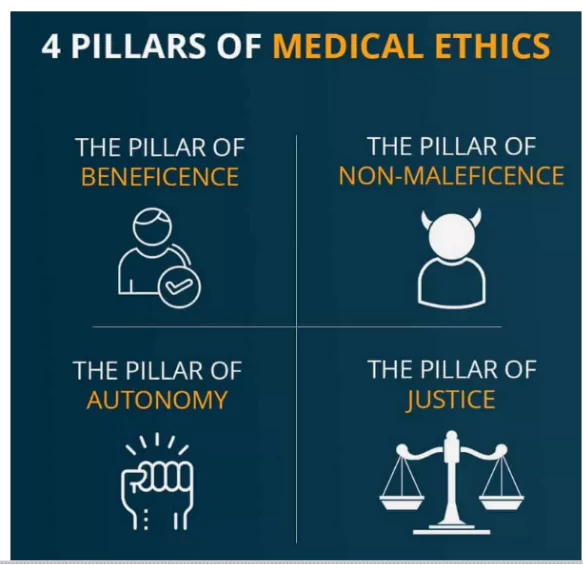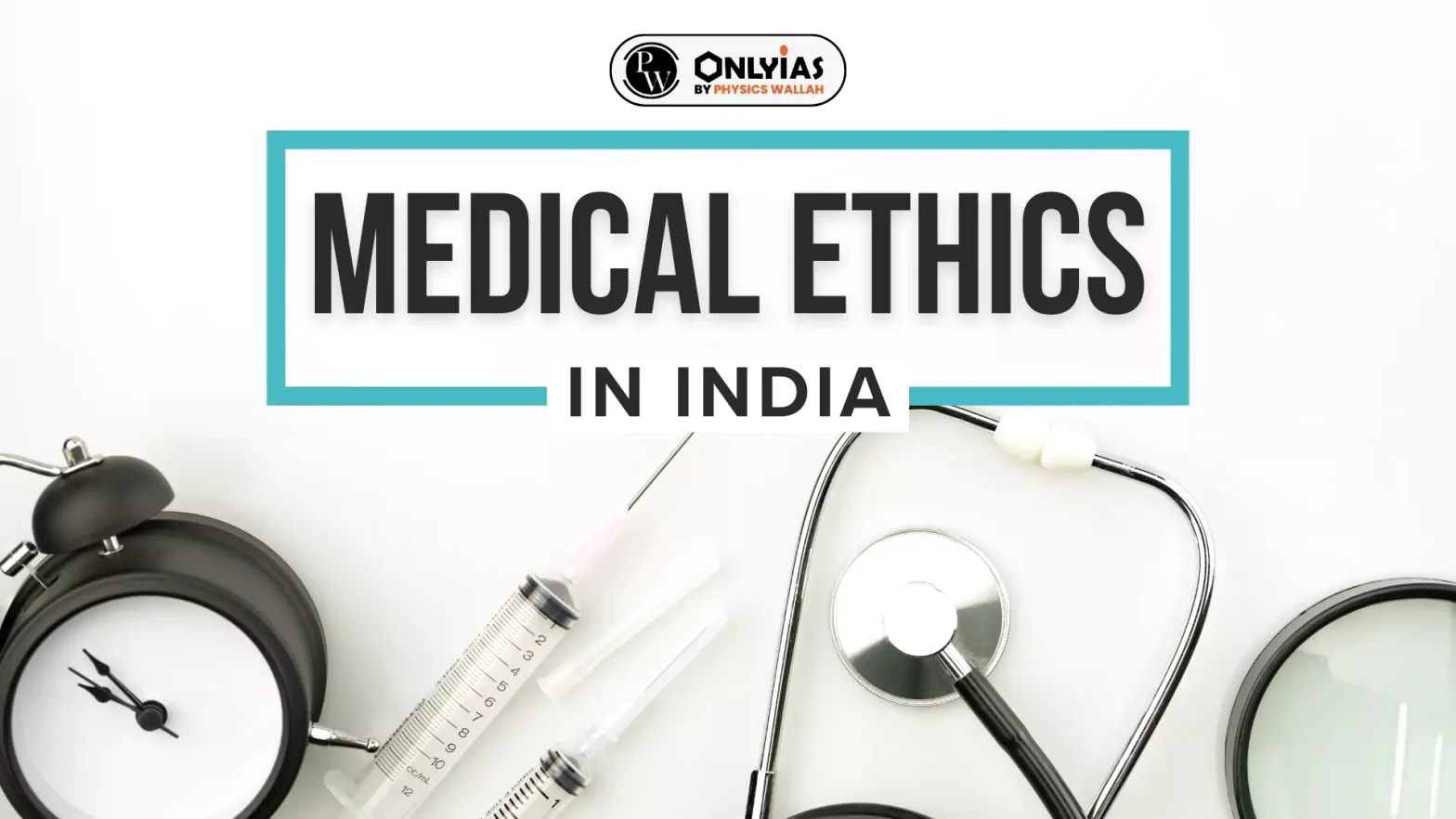In India, the primary guardrails that are supposed to be a check on the abuse of medical ethics do not function.
Overview of Abuse of Medical Ethics in India
On January 10, 2021, Rashida Bee (representing the Bhopal Gas Peedit Mahila Stationary Karmchari Sangh), Nawab Khan (representing Bhopal Gas Peedit Mahila Purush Sangharsh Morcha), Rachna Dhingra (representing the Bhopal Group for Information and Action) and Nausheen Khan (representing Children Against Dow Carbide) wrote a letter to Prime Minister Narendra Modi and the then Minister of Health and Family Welfare, Dr. Harsh Vardhan.
- Allegations Over Clinical Trials: In the letter, they alleged irregularities and ethical violations in the conduct of the clinical trial for Bharat Biotech’s Covaxin (a COVID-19 vaccine by the People’s Hospital in Bhopal, Madhya Pradesh.
- Violations of Ethics Guidelines: The letter further alleged gross violations of ethics guidelines including:
- Violations of informed consent procedures,
- Enrolment of vulnerable population among study participants,
- Non-reporting of adverse events and
- Lack of monitoring and follow-up of study participants among others.
Enroll now for UPSC Online Course
About Medical Ethics
Medical ethics is the disciplined study of morality in medicine aimed at improving medical moral morality.

- Primary Goal: Improve medical moral morality by identifying the ethical obligations of physicians to their patients.
- The four pillars of medical ethics are:
- Beneficence (doing good).
- Non-maleficence (to do no harm).
- Autonomy (giving the patient the freedom to choose freely, where they are able).
- Justice (ensuring fairness).
- Sources of Morality:
- Applicable law.
- Political heritage of self-government.
- World religions.
- Ethnic and cultural traditions.
- Families.
- Personal experience.
- Traditions and practices of medicine.
- Application of Ethical Principles: Ethical principles are designed to guide judgments about what we ought and ought not to do and behavior based on such judgments.
Secular Medical Ethics
- Emergence: Emerged during the eighteenth-century European and American Enlightenments.
- Characteristics:
- No reference to revelation through sacred texts.
- Based on reasoned discourse, ethical analysis, and argument.
- Not intrinsically hostile to religious beliefs.
- Nature:
- Transnational, transcultural, and transreligious.
- Essentially, global medical ethics.
|
Overview of Code of Medical Ethics
According to the Indian Medical Council (Professional Conduct, Etiquette and Ethics) Regulations, 2002 below given are major duties and responsibilities of the Doctors in general:
| Duty |
Description |
| 1. Maintaining good medical practice |
Physicians must respect human dignity, continually improve skills, share knowledge, follow scientific methods, engage in medical societies, and participate in continuing education programs. |
| 2. Use of Generic names of drugs |
Physicians should prescribe drugs using generic names and ensure their use is rational. |
| 3. Highest Quality Assurance in patient care: |
Physicians should prevent unqualified individuals from joining the profession and ensure only registered attendants assist in their practice where professional skill is required. |
| 4. Exposure of Unethical Conduct |
A Physician should expose, without fear or favour,
incompetent or corrupt, dishonest or unethical conduct on the part of members of the profession. |
| 5. Evasion of Legal Restrictions |
Physicians must follow medical laws, assist in enforcing sanitary regulations, and comply with various health-related acts and regulations for public health protection. |
Need for Medical Ethics
Medical ethics is essential in healthcare for various reasons, ensuring that medical practice adheres to high moral standards. Here are key points highlighting the need for medical ethics:
- Ensures Beneficence and Non-Maleficence: Medical ethics ensures that these core principles guide medical practice, promoting patient well-being and preventing harm.
- Beneficence: Physicians have an ethical obligation to act in the best interests of patients.
- Non-Maleficence: Physicians must avoid causing harm to patients.
- Example: A physician carefully considers the potential side effects of a prescribed medication, choosing a safer alternative when possible to avoid adverse reactions.
- Respect for Patient Autonomy: Medical ethics provides guidelines for informed consent, ensuring patients are fully aware of their treatment options and the potential risks and benefits.
- Example: Before a surgical procedure, a physician thoroughly explains the risks, benefits, and alternatives to the patient, ensuring they understand and consent to the operation without any coercion.
- Ensures Justice: Medical ethics helps address disparities in healthcare access and treatment, promoting equity and fairness in medical practice.
- Example: A physician advocates for low-income patients by working in a community health clinic, ensuring they receive the same quality care as those with better financial means.
- Upholding Professional Integrity: Medical ethics maintains high standards of conduct, protecting the integrity of the profession and fostering public trust.
- Example: A doctor who discovers a colleague falsifying patient records reports the misconduct to the relevant authorities, upholding the ethical standards of the profession.
- Foster High Standard of Moral Character: Medical ethics instills values that uphold the moral character of physicians, guiding them to act with integrity and responsibility.
- Example: A physician volunteers their time to provide free medical care to underserved populations, demonstrating a commitment to ethical principles and societal well-being.
Check Out UPSC CSE Books From PW Store
Ethical Issues Involved in the Medical Field
Ethical issues in the medical field are multifaceted and impact various aspects of healthcare practice. Understanding these issues is crucial for ensuring ethical standards are maintained. Here are the key ethical challenges:
- Violations of Ethics Guidelines: The development of potential therapeutic agents is often complicated by subjective and sometimes objective violations of ethical guidelines.
- For example, the letter written to Prime Minister further alleged gross violations of ethics guidelines.
- Violation of Informed Consent: The bigger issue in our country is the historic and repeated violation of informed consent when patients are enrolled in clinical studies.
- For example, more than anecdotal evidence exists that poor and uneducated people are enrolled in such studies without fully informing them of potential harm from the therapeutic candidate being evaluated in a clinical study.
- Lack of Ethics Committees Functioning: The job of ensuring atrocities do not occur falls on an institutional ethics committee. While such committees exist on paper and in our regulations, their function and effectiveness are at best patchy.
- For example, a publication (2022) by Gayatri Saberwal et al. evaluated 1,359 Phase II or III interventional studies registered in the Clinical Trials Registry–India (CTRI) identified as many as 30 problems with the way in which our ethics committees function.
- These include clinical trials without any ethics committees, and trials with more sites than functional ethics committees.
- The simple takeaway from this analysis is that the primary guardrails that are supposed to be a check on abuse of medical ethics do not function in our country.
- Challenges in Ensuring Non-Maleficence: There are notable challenges in ensuring non-maleficence in medical ethics which involves avoiding harm, balancing treatment risks, addressing medical errors, and maintaining patient safety amidst evolving medical practices and technologies.
- For example, the Indian drug regulator, Central Drugs Standard Control Organisation had approved the vaccine candidate prior to the completion of the recruitment for the vaccine candidate’s Phase III study for “Restricted Use of Covaxin under Clinical Trial Mode” — a term and process that finds no mention in India’s Drug Regulatory Framework, the Drugs and Cosmetics Act and its accompanying Drugs and Cosmetics Rules, 2019.
- Lack of Strong Whistle-Blower Protection Statutes: Unlike the United States, India does not have a law that protects those who take great personal risks to bring wrongdoing to public notice.
- The existing law, whose scope is limited to public servants to begin with, was further diluted in 2015, making it a dead letter law.
- Research Ethics: Development of life-saving medicines often entails balancing the risk to the patient with the projected benefit from using the therapeutic candidate.
- In most cases, there is not enough data to make an informed decision, which is not straightforward and requires specialised knowledge and experience. This requires better guardrails than we have in order to ensure that the basic tenets of ethics are not violated in the process.
- For example, the make up things such as “emergency use authorization in clinical trial mode” and work hard to justify it are glaring examples of gross violations of medical ethics in our recent past.
- End-of-Life Care: Issue of making decisions about treatment and care for terminally ill patients, including euthanasia and palliative care.
- Example: Debates over the legality and morality of physician-assisted suicide in various jurisdictions.
- Conflicts of Interest: Conflicts of interest in medical ethics arise from financial or personal interests influencing impartial medical decision-making, compromising patient care and research integrity.
- Example: Pharmaceutical industry relationships with healthcare providers influencing prescription practices.
- Inequitable Access: Lack of fair access to healthcare services and addressing disparities in health outcomes based on socioeconomic status, race, or geography.
- Example: Ethical challenges in providing adequate healthcare to marginalized or underserved populations.
Major Laws Regulating Practice of Medicine in India
- Drugs and Cosmetics Act, 1940.
- Pharmacy Act, 1948.
- Narcotic Drugs and Psychotropic substances Act, 1985.
- Medical Termination of Pregnancy Act, 1971.
- Transplantation of Human Organ Act, 1994.
- Mental Health Act, 1987.
- Environmental Protection Act, 1986.
- Pre–natal Sex Determination Test Act, 1994.
- Drugs and Magic Remedies (Objectionable Advertisement) Act, 1954.
- Persons with Disabilities (Equal Opportunities and Full Participation) Act, 1995.
- Bio -Medical Waste (Management and Handling) Rules, 1998.
|
Way Forward
Addressing the ethical challenges in the medical field requires a comprehensive and proactive approach. The following strategies outline the way forward to enhance ethical practices in healthcare:
- Strengthening Ethics Guidelines and Enforcement: Implement stricter enforcement mechanisms to ensure adherence to ethical guidelines in clinical trials.
- Strengthen institutional ethics committees with clear mandates and resources to monitor studies effectively.
- Promoting Transparency and Informed Consent: Ensure thorough and transparent informed consent processes, especially for vulnerable populations.
- Educate healthcare providers and researchers on the importance of ethical conduct and patient rights.
- Updating Drug Regulatory Frameworks: Revise regulatory frameworks to address gaps and ambiguities, ensuring clarity on terms like “Restricted Use under Clinical Trial Mode.”
- Align regulations with international standards to enhance credibility and trust in drug approval processes.
- Support for Research Ethics: Invest in training and capacity-building for professionals involved in clinical research to uphold ethical standards.
- Establish comprehensive guidelines for risk assessment and benefit analysis in drug development.
- Legislative Reforms: Advocate for robust whistleblower protection laws to encourage reporting of ethical violations without fear of retaliation.
- Expand protections beyond public servants to cover all individuals involved in healthcare and research.
- Enhancing Ethics Committee Efficiency: Address gaps identified in ethics committee functioning, such as inadequate oversight and insufficient resources.
- Standardize practices and procedures across all ethics committees to ensure consistency and effectiveness.
- Ethical Research Conduct: Emphasize the importance of integrity in research findings and data reporting.
- Foster a culture of ethical conduct among researchers through education, mentorship, and peer review.
- Ethical Decision-Making in End-of-Life Care: Engage in public dialogue and legislative review to establish clear guidelines for end-of-life care decisions, including euthanasia and palliative care.
- Ensure healthcare providers receive training on ethical considerations and patient autonomy in end-of-life scenarios.
- Mitigating Conflicts of Interest: Implement strict policies to manage conflicts of interest among healthcare providers and researchers.
- Enhance transparency in financial relationships between healthcare professionals and pharmaceutical companies.
- Healthcare Equity Initiatives: Develop strategies to reduce disparities in healthcare access based on socioeconomic status, race, and geography.
- Advocate for policies that prioritize healthcare resources for marginalized and underserved populations.
Enroll now for UPSC Online Classes
Conclusion
Swami Vivekananda’s quote “Service to Man is Service to God” can serve as guiding light in medical ethics highlighting the duty of compassionate, selfless care, emphasizing respect for human dignity and moral responsibility in healthcare.
![]() 5 Jul 2024
5 Jul 2024

